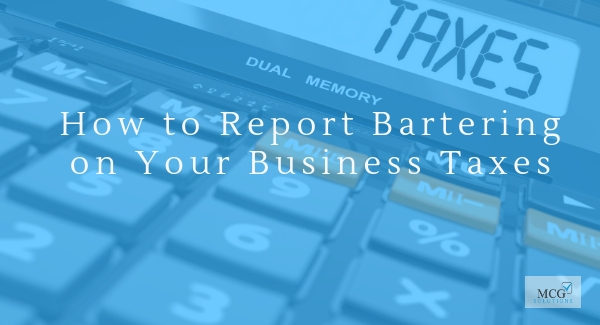Does this sound familiar? You manage a cleaning service, but need help with your business’ tax return. You reach out to a local accountant, who would love to utilize your cleaning services. You strike up a deal to exchange your cleaning service for her tax help.
Maybe you don’t have a cleaning business, or you’re not an accountant, but you might still be familiar with the example above. Bartering is the act of exchanging goods or services without using money.
According to the International Reciprocal Trade Associate, the barter economy comprises an estimated $12 to 14 billion. If you utilize bartering during the course of business, the IRS considers this taxable income that must be reported. The income is taxable in the year it is realized, i.e. products sold or services rendered. The income is recorded on your tax forms the same way you would for other types of income.
If you use barter for your business, here’s what you need to know:
Reporting barter income on your taxes
If you have paid a business through bartering, you need to report it on Form 1099-B. If another business paid you, they must do the same. You should record the fair market value of the product or service you provided. This form is due by mid-February of the following year. In some cases you may need to use Form 1099-MISC; check with your accountant which form(s) you’ll need.
Because barter is considered business income, it should be reported on your business income tax return along with your business’ other income.
The IRS allows some exceptions to reporting barter income:
- Fewer than 100 barter transactions in a year
- Transactions less than $1 in value
- Bartering with certain exempt foreign persons
- Transactions involving corporate members or clients of barter exchange which may be reported on an aggregate basis
Using a barter exchange
Many businesses use a barter exchange for bartering with other businesses. A barter exchange is an organization that functions as a third party to coordinate member transactions and function as a bank tracking income and expenses between members. At year-end, the barter exchange prepares Form 1099-B for members, showing the amount they received during the year.
Barter’s effect on your taxes
Because barter is taxable income, it may impact your tax liability, including self-employment tax, state tax, employment tax and excise tax.
In some cases you can deduct costs related to barter transactions. For example, if you’re providing services to a client and you need to travel to the client’s location, you may be able to deduct the business travel expenses. If you pay membership fees to a barter exchange, you may be able to deduct that cost.
If you’re looking for tax professionals to support your business, MCG Solutions is here for you. Contact us today to get started.

